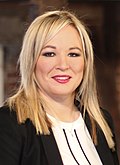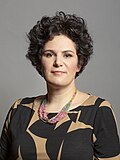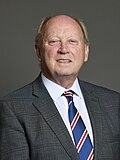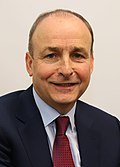List of political parties in Northern Ireland
 From Wikipedia - Reading time: 17 min
From Wikipedia - Reading time: 17 min
| This article is part of a series within the Politics of the United Kingdom on the |
 |
|---|
Although Northern Ireland is a part of the United Kingdom, it has a quite distinct party system from the rest of the country, as the Labour Party and Liberal Democrats do not contest elections there (though the Liberal Democrats have links with the Alliance Party), and the Conservative Party has received only limited support in recent elections. Party affiliation is generally based on religious and ethnic background.
The Northern Ireland Assembly is elected by single transferable vote and the composition of the Northern Ireland Executive is by power sharing determined by the D'Hondt system, among the members elected to the assembly. Northern Ireland also elects 18 MPs to the House of Commons, and there are elections to 11 local government districts.
Some parties, such as Sinn Féin and the Workers' Party, are organised on an all-Ireland basis. Others such as the Conservative Party are organised on an all-United Kingdom basis. There are many Northern Ireland-specific parties and these, on the whole, predominate.
The distinction between "unionist/loyalist", "nationalist/republican" and "other" is not always easy with some parties and individuals. Some have defined themselves less by their position on the "Border Question" than on other political issues.
For example, the former Republican Labour Party/Social Democratic and Labour Party MP Gerry Fitt's career suggests he was first and foremost a socialist rather than a nationalist and he eventually left the SDLP claiming it had drifted from its founding intentions. Similarly the Workers' Party has its roots in the republican Official IRA but nowadays is considered to be a non-violent socialist and nationalist party. Several parties strive to be avowedly non-sectarian and would not consider themselves to be either unionist or nationalist. The Northern Ireland Assembly requires MLAs to designate themselves either "Unionist", "Nationalist" or "Other". This is a designation that is particularly resented by those who designate as "Other", as they have no input on who becomes First or Deputy First Minister.
There are some who see the terms "Unionist"/"Loyalist" and "Nationalist"/"Republican" as being of more relevance to the community that the party seeks to represent rather than the position on the border question. Several of the "Other" parties strive to be non-sectarian but have a clear position on the border.
Political parties with elected representation at a local, national, or UK level
[edit]Party details
[edit]Party representation
[edit]| Party | Representation (as of 3 October 2023)[33] | ||||||
|---|---|---|---|---|---|---|---|
| UK Parliament | Assembly | Local councils | |||||
| House of Commons | House of Lords | ||||||
| Sinn Féin | 7 | 0 | 27 | 144 | |||
| Democratic Unionist Party | 5 | 6 | 25 | 122 | |||
| Alliance Party of Northern Ireland | 1 | 0[nb 1] | 17 | 67 | |||
| Ulster Unionist Party | 1 | 2 | 9 | 54 | |||
| Social Democratic and Labour Party | 2 | 0[nb 2] | 8 | 39 | |||
| Traditional Unionist Voice | 1 | 0 | 1 | 10 | |||
| People Before Profit | 0 | 0 | 1 | 2 | |||
| Green Party Northern Ireland | 0 | 0 | 0 | 5 | |||
| Progressive Unionist Party | 0 | 0 | 0 | 1 | |||
| Aontú | 0 | 0 | 0 | 0 | |||
| Northern Ireland Conservatives | 0 | 2 | 0 | 0 | |||
| Labour Party in Northern Ireland | 0 | 1 | 0 | 0 | |||
| Northern Ireland Liberal Democrats | 0 | 1 | 0 | 0 | |||
- ^ Lord Alderdice, leader of the Alliance from 1987–98, has sat in the Lords since 1996, taking the Lib Dem whip.
- ^ Margaret Ritchie, leader of the SDLP from 2010–11, has sat in the Lords since 2019, resigning from the party to do so.
Other registered parties
[edit]Unionist and loyalist
[edit]| Party | Founded | Political position |
Ideology | Leader(s) | ||
|---|---|---|---|---|---|---|
Heritage Party |
2020 | Right-wing | Euroscepticism British unionism British nationalism Social conservatism Right-wing populism |

|
David Kurten | |
Nationalist and republican
[edit]Others
[edit]| Party | Founded | Political position |
Ideology | Leader(s) | Notes | ||
|---|---|---|---|---|---|---|---|
Cross-Community Labour Alternative |
2015 | Left-wing | Democratic socialism Anti-capitalism Nonsectarianism |
— | Owen McCracken | — | |
Socialist Party |
1996 | Left-wing to far-left | Democratic socialism Political radicalism[48] Trotskyism[49] Euroscepticism[50] |
— | Collective leadership | — | |
Unregistered parties
[edit]Candidates for unregistered parties may choose either to be listed as "Non-Party", or to leave the section blank on the ballot paper, in the same manner as independent candidates.
Nationalist and Republican
[edit]- 32 County Sovereignty Movement - Does not contest elections, operates as a pressure group
- Anti-Imperialist Action Ireland - Does not contest elections
- Fine Gael
- National Party
- Republican Sinn Féin (RSF)
Unionist
[edit]Inactive parties
[edit]Unionist and loyalist
[edit]- Belfast Labour Party
- British Ulster Dominion Party
- Commonwealth Labour Party
- Independent Unionist Association
- Labour Unionist Party
- NI21
- UKIP Northern Ireland
- Northern Ireland Unionist Party - deregistered 2008
- Protestant Coalition
- Ulster Defence Party* (UDP)
- Protestant Unionist Party (evolved into the DUP)
- Ulster Constitution Party
- Ulster Democratic Party
- Ulster Loyalist Democratic Party
- Ulster Popular Unionist Party
- Ulster Progressive Unionist Association
- Ulster Protestant League
- Ulster Resistance
- Ulster Unionist Labour Association
- Unionist Party of Northern Ireland
- United Kingdom Unionist Party - deregistered 2008
- United Ulster Unionist Council
- United Ulster Unionist Party
- United Unionist Coalition (UUC)
- Vanguard Progressive Unionist Party
- Volunteer Political Party
Nationalist and Republican
[edit]- All Ireland Anti-Partition League
- Federation of Labour
- Fianna Uladh
- Irish Anti-Partition League
- Independent Socialist Party
- Irish Independence Party
- National Democratic Party
- National League of the North
- National Unity
- Nationalist Party
- Northern Council for Unity
- Official Sinn Féin (now Workers' Party)
- People's Democracy
- Red Republican Party
- Republican Congress
- Republican Labour Party
- Saor Éire
- Socialist Republican Party
- Unity
Others
[edit]- Commonwealth Labour Party
- Communist Party of Ireland (Marxist-Leninist)
- Communist Party of Northern Ireland
- Irish Labour Party (contests elections in the Republic)
- Labour coalition
- Labour Party of Northern Ireland
- Northern Ireland Labour Party
- Northern Ireland Women's Coalition
- Newtownabbey Labour Party
- Newtownabbey Ratepayers Association
- Natural Law Party
- Social Democratic Party - The post-1988 rump of the party stood in a Northern Ireland by-election in 1990; the party as a whole existed and was more prominent in Great Britain from 1981 to 1988 although the post-1990 rump group still exists.
- Ulster Independence Movement
- Ulster Liberal Party
- Ulster Movement for Self-Determination
- United Labour Party (Northern Ireland)
- Ulster Third Way - deregistered 2005
- Veritas - Dissolved June 2015
- Vote for Yourself Party - disbanded April 2009, de-registered 8 June 2009
- World Socialist Party (Ireland) - Dissolved in the 1990s
Flowchart of all political parties in Northern Ireland
[edit]
Party leaders
[edit]Party leaders serving 10 years or more are
See also
[edit]- Politics of Northern Ireland
- Lists of political parties
- Political make-up of local councils in Northern Ireland
- List of political parties in the Republic of Ireland
Notes
[edit]- ^ Although Mary Lou McDonald is the party president, O’Neill serves as vice-president and as First Minister, functions as the party’s leader in Northern Ireland.
- ^ Lord Alderdice, leader of the Alliance from 1987–98, has sat in the Lords since 1996, taking the Liberal Democrat whip.
- ^ Margaret Ritchie, leader of the SDLP from 2010–11, has sat in the Lords since 2019 as a Labour peer, resigning from the SDLP to do so.
- ^ In the Northern Ireland Assembly, the party's MLAs sign the register as "socialist" when asked if they are "unionist" or "nationalist", resulting in an official designation of "Other". However, People Before Profit is in favour of Irish reunification.
- ^ Since 2007, Fianna Fáil has been officially registered in Northern Ireland, but has not formally fielded any election candidates as of yet, despite members passing motions to at successive árdfheiseanna.[36] Ógra Fianna Fáil launched cumainn (branches) at QUB and UU in the same year. From 2019 to 2022, it was in partnership with the SDLP.[37]
References
[edit]- Sources
- ^ Anttiroiko, Ari-Veikko; Mälkiä, Matti (2007). Encyclopedia of Digital Government. Idea Group Inc (IGI). p. 394. ISBN 978-1-59140-790-4.
- ^ Salgado, Susana (7 December 2018). Mediated Campaigns and Populism in Europe. Springer. ISBN 978-3-319-98563-3.
- ^ "It will be ‘difficult’ for May to survive, says N Ireland’s DUP", By Vincent Boland & Robert Wright. Financial Times. 9 June 2017. Retrieved 10 June 2017.
- ^ "Who Are The DUP? The Democratic Unionist Party Explained", LBC. 9 June 2017. Retrieved 10 June 2017.
- ^ Russell, Deacon (2012). "Devolution in the United Kingdom". Representation: 236. ISBN 978-0-7486-6973-8.
- ^ "Parties | Northern Ireland Political Parties". BBC News. 14 October 1998. Archived from the original on 12 September 2015. Retrieved 27 August 2015.
- ^ Nordsieck, Wolfram (2017). "Northern Ireland/UK". Parties and Elections in Europe. Archived from the original on 7 November 2016. Retrieved 28 September 2018.
- ^ Deacon, Russell (2012). Devolution in the United Kingdom. Edinburgh University Press. p. 186. ISBN 978-0-7486-6973-8. Archived from the original on 23 December 2016. Retrieved 6 October 2016.
- ^ "History – NI: The Troubles – Fact Files". BBC. 18 September 2014. Archived from the original on 23 December 2019. Retrieved 27 August 2015.
- ^ "Alliance party". Politics.co.uk. Archived from the original on 19 May 2014. Retrieved 27 August 2015.
- ^ a b c Brendan Hughes (22 February 2016). "EU referendum: Where Northern Ireland parties stand". Irish News. Archived from the original on 29 October 2020. Retrieved 4 March 2017.
- ^ Ari-Veikko Anttiroiko; Matti Mälkiä (2007). Encyclopedia of Digital Government. Idea Group Inc (IGI). pp. 394–. ISBN 978-1-59140-790-4. Archived from the original on 25 December 2018. Retrieved 17 October 2015.
- ^ a b c d e f Nordsieck, Wolfram (2017). "Northern Ireland/UK". Parties and Elections in Europe. Archived from the original on 7 November 2016. Retrieved 28 September 2018.
- ^ "Nesbitt says NI needs liberal progressive politicians". Belfast Newsletter. Archived from the original on 26 April 2016. Retrieved 14 April 2016.
- ^ Driver, Stephen (2011). Understanding British Party Politics. Polity. p. 188. ISBN 978-0-7456-4078-5. Archived from the original on 27 May 2016. Retrieved 25 November 2015.
- ^ Paul Dixon; Eamonn O'Kane (2014). Northern Ireland Since 1969. Routledge. p. 6. ISBN 978-1-317-86657-2. Archived from the original on 30 April 2016. Retrieved 25 November 2015.
- ^ "The Good Friday Agreement – SDLP". Archived from the original on 26 January 2014. Retrieved 6 February 2014.
- ^ Walsh, John (30 April 2021). "Don't envy the next DUP leader. They face an almost impossible job". Archived from the original on 14 May 2021. Retrieved 14 May 2021 – via www.thetimes.co.uk.
- ^ Nordsieck, Wolfram. "Northern Ireland (UK)". Parties and Elections in Europe. Retrieved 24 February 2024.
- ^ "About TUV". Traditional Unionist Voice. Archived from the original on 12 March 2021. Retrieved 20 March 2021.
- ^ Three Compelling Reasons to Vote Leave Archived 2 October 2017 at the Wayback Machine. Traditional Unionist Voice (official website). Published 20 June 2016. Retrieved 2 October 2017.
- ^
- O'Connell, Hugh (16 September 2015). "Is this the left-wing party you've been waiting for?". TheJournal.ie. Archived from the original on 25 February 2020. Retrieved 15 February 2020.
- Power, Jack (7 January 2019). "Dublin councillor resigns from People Before Profit". The Irish Times. Archived from the original on 14 April 2019. Retrieved 15 February 2020.
- "People Before Profit pair 'of one political mind' says Eamonn McCann". The Irish News. 10 May 2016. Archived from the original on 18 January 2017. Retrieved 15 February 2020.
- ^
- McElroy, Gail (2017). "5". Party Competition in Ireland: The emergence of a left right dimension? (PDF). pp. 1–10.
- "Party Profiles: People Before Profit/Solidarity". irelandelects.com. Ireland Elects. Retrieved 7 April 2022.
- Cox, James (21 November 2021). "Polls suggest Sinn Féin will dominate next election but Government formation will be tricky". Retrieved 7 April 2022.
Both Prof Murphy and Prof Regan pointed out that Sinn Féin would have trouble trying to do business with any of the far-left parties such as People Before Profit.
- Hearne, Rory (May 2015). "The Irish water war" (PDF). Interface: A Journal for and About Social Movements. 7 (1): 309–321. Retrieved 9 April 2022.
Right2Water involves a number of small trade unions (Unite, Mandate, the Communications Worker's Union, the CPSU and OPATSI), as well as the Left parties of Sinn Fein and the united front organisations of two Trotskyist parties (People Before Profit and the Anti Austerity Alliance), and the Workers' Party........The 'Campaign against the Household and Water Taxes' involved socialists from the far left Trotskyist parties
- ^
- "The PBP/Solidarity explainer: from Campaigns to Revolution". Village Magazine.ie. 6 February 2020. Archived from the original on 21 October 2020. Retrieved 21 October 2020.
- Finn, Daniel (4 August 2021). "The Tributary". New Left Review.
- Browne, Harry (13 February 2020). "Irish voters reject the Right: a new opportunity for the Left?". Retrieved 7 April 2022.
a loose historically-trotskyist alliance called "Solidarity – People Before Profit" (S-PBP), some affiliated to the Committee for a Workers International's successor International Socialist Alternative, and others to the Cliffite International Socialist Tendency
- Browne, Harry (13 February 2020). "Irish voters reject the Right: a new opportunity for the Left?". Retrieved 7 April 2022.
a loose historically-trotskyist alliance called "Solidarity – People Before Profit" (S-PBP), some affiliated to the Committee for a Workers International's successor International Socialist Alternative, and others to the Cliffite International Socialist Tendency
- Ó Dochartaigh, Niall (3 February 2021). "Beyond the dominant party system: the transformation of party politics in Northern Ireland". Irish Political Studies. 36 (1): 7–28. doi:10.1080/07907184.2021.1877897. S2CID 232272571.
The exception was People Before Profit, a small all-Ireland, pro-unity, Trotskyist party that aligned with the Lexit (left-wing Brexit) position of a section of the British left.
- Dunphy, Richard (2017). "Beyond Nationalism? The Anti-Austerity Social Movement in Ireland" (PDF). Journal of Civil Society. 13 (3): 267–283. doi:10.1080/17448689.2017.1355031. S2CID 148867851. Retrieved 7 April 2022.
- ^ Nordsieck, Wolfram (2011). "Ireland". Parties and Elections in Europe. Archived from the original on 28 July 2013.
- ^ "DUP and Sinn Féin stable as Alliance Party rises in Northern Ireland local election". Nationalia. Archived from the original on 28 January 2021. Retrieved 21 January 2021.
- ^ "Election Manifesto 2020" (PDF). Archived from the original (PDF) on 3 February 2020. Retrieved 21 November 2020.
- ^ Hurley, Sandra (10 October 2024). "People Before Profit select Boyd Barrett as party leader". RTÉ. Retrieved 11 October 2024.
- ^ "Archived copy" (PDF). Archived (PDF) from the original on 4 July 2020. Retrieved 9 August 2020.
{{cite web}}: CS1 maint: archived copy as title (link) - ^ a b Coulter, John (11 September 2019). "A socialist alternative for Northern Ireland?". Northern Slant. Archived from the original on 4 July 2020. Retrieved 9 August 2020.
- ^ Edwards, Aaron (2007). "Democratic Socialism and Sectarianism: The Northern Ireland Labour Party and Progressive Unionist Party Compared". Politics. 27 (1): 24–31. doi:10.1111/j.1467-9256.2007.00275.x. S2CID 145393084.
- ^ New Statesman: Volume 131, Issues 4569-4576. London: New Statesman. 2002. p. 56.
- ^ "Local Council Political Compositions". Open Council Date UK. 24 May 2022. Retrieved 10 November 2021.
- ^ "SDLP councillor quits to join Aontú". News Letter. 27 July 2019. Archived from the original on 25 September 2019. Retrieved 25 September 2019.
- ^ O'Malley, Eoin (16 June 2019). "Eoin O'Malley: Sound the death knell for pro-life Renua". The Times. Archived from the original on 23 December 2019. Retrieved 23 December 2019.
- ^ "Highland Radio – Latest Donegal News and Sport » Fianna Fail Ard Fheis passes two significant Donegal North East motions". 22 March 2014. Archived from the original on 7 March 2016. Retrieved 25 July 2015.
- ^ "SDLP ends three-year partnership with Fianna Fail as party examines poor Assembly election results". Belfast Telegraph. 28 September 2022. Retrieved 22 October 2022.
- ^ Fianna Fail on election footing now, says Martin Archived 30 August 2017 at the Wayback Machine. Irish Independent. Author – Daniel McConnell. Published 1 January 2015. Retrieved 18 July 2017.
- ^ Micheal Martin to replace Brian Cowen as Fianna Fail leader Archived 16 April 2018 at the Wayback Machine. The Telegraph. Published 26 January 2011. Retrieved 18 July 2017.
- ^ Weakened Irish PM faces delicate balancing act Archived 30 August 2017 at the Wayback Machine. EUobserver. Author – Shona Murray. Published 12 May 2016. Retrieved 18 July 2017.
- ^ George Taylor; Brendan Flynn (2008). "The Irish Greens". In E. Gene Frankland; Paul Lucardie; Benoît Rihoux (eds.). Green Parties in Transition: The End of Grass-roots Democracy?. Ashgate Publishing, Ltd. p. 97. ISBN 978-0-7546-7429-0. Archived from the original on 26 December 2018. Retrieved 22 October 2016.
- ^ John Barlow; David Farnham; Sylvia Horton; F.F. Ridley (2016). "Comparing Public Managers". In David Farnham; Annie Hondeghem; Sylvia Horton; John Barlow (eds.). New Public Managers in Europe: Public Servants in Transition. Springer. p. 19. ISBN 978-1-349-13947-7. Archived from the original on 26 December 2018. Retrieved 22 October 2016.
- ^ Titley, Gavan (24 February 2011). "Beyond the yin and yang of Fine Gael and Fianna Fáil". The Guardian. London. Retrieved 11 December 2016.
- ^ Doyle, Paulie (22 March 2019). "Understanding the 'New IRA', Who Sent Explosives Around the UK". VICE UK (Motherboard). Vice Media. Archived from the original on 24 April 2020. Retrieved 18 October 2021.
- ^ Murray, Gemma (19 February 2020). "Saoradh release statement claiming Sinn Fein not under threat - after Michelle O'Neill asks all members to be 'vigilant'". The News Letter. Belfast: JPIMedia. Archived from the original on 18 October 2021. Retrieved 18 October 2021.
- ^ Trumbore; Owsiak (2019). "Brexit, the Border, and Political Conflict Narratives in Northern Ireland". Irish Studies in International Affairs. 30: 195. doi:10.3318/isia.2019.30.12. S2CID 214476378.
- ^ Reinisch, Dieter (15 November 2019). "Opinion: I went to the Saoradh party conference to see where radical republicanism is going". TheJournal.ie. Retrieved 16 November 2019.
- ^ Silke, Henry (14 June 2014). "Ireland: Left surge in South's local and European elections". International Journal of Socialist Renewal. Archived from the original on 15 February 2015. Retrieved 14 June 2014.
- ^ Routledge Handbook of European Elections. Edited by Donatella M.Viola. Published by Routledge. First published in 2016, in Oxon, United Kingdom. Accessed via Google Books.
- ^ "Ireland, Brexit and why the EU must be opposed". Socialist Party. 28 June 2016. Retrieved 10 February 2017.
 KSF
KSF













